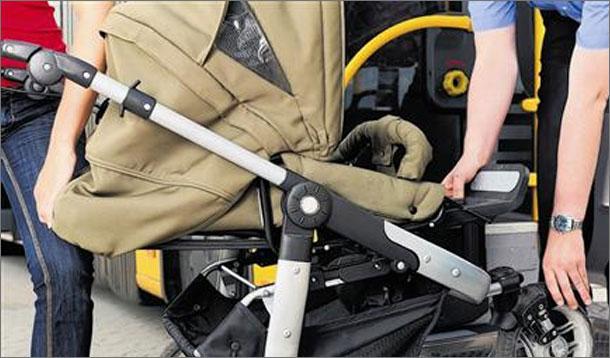
Bus drivers and parents are embroiled in a tete a tete over the number of strollers on public buses. After a bus driver recently complained about a mom's stroller, another rider requested that a policy should be put in place by the Toronto Transport Commission (TTC) limiting the number of strollers on board at any given time.
A passenger Elsa La Rosa complained that strollers "block the aisles and displace other riders on transit." But parents are up in arms because clearly they have a right to travel just like any other citizen. So what should be done to solve the stroller problem?
According to an article in the Star, LaRosa suggested a limit of two strollers should be imposed by each bus during rush hour, and no more than three off-peak. But what about the parent who needs to get somewhere and hasn't got another means of transport? Do they just cross their fingers and hope the limit hasn't been met, or do they wait for the next bus which, depending on the timetable, can mean waiting the best part of an hour.
“Speaking with my bus operators, they do have problems, particularly if you get a collection of very large strollers onto the bus—it does cause quite an obstruction,” said TTC CEO Andy Byford.
Is it discriminatory to tell parents when they can and can't travel? Admittedly no one wants to travel on public transport during rush hour, but sometimes it's unavoidable. Life isn't always convenient or flexible.
Recently I had to take my son to medical appointment downtown, and had to endure the subway at peak hour. It wasn't pleasant or ideal, but it was still my right to do so.
“We don’t charge people for bicycles, we don’t charge people for having a walker or electric scooter, and I don’t expect we would ever charge anybody for having a stroller,” said TTC chair Karen Stintz.
What do you think of stroller congestion? Do you think a limit on the number of strollers would help?

Raise your hand if you're sure that you need deodorant? Apparently new research indicates that some of us don't actually produce underarm odour. Yet we use deodorant anyway because of cultural expectations.
According to an article in Science Daily, of the 6,495 women studied as part of the Children of the 90s study from the University of Bristol, 75 per cent who have a particular genotype do not produce underarm odour, yet 78% of those with the genotype still used deodorant on all or most days.
Ironically, a good percentage of those who are subject to smelly pits don't wear deodorant. This begs the question, if so many people don't need deodorant, why are we still buying and applying needless chemicals to our skin every day?
"These findings have some potential for using genetics in the choice of personal hygiene products," said Dr Santiago Rodriguez, author of the paper in the Journal of Investigative Dermatology. "A simple gene test might strengthen self-awareness and save some unnecessary purchases and chemical exposures for non-odour producers."
Wondering whether you have the active ABCC11 gene? The authors have a tip to help you find out: those with the rare gene tend to also have "dry (rather than sticky) ear wax and that checking ear wax is a good indicator of whether or not a person produces underarm odour."
There you have it, folks: the nitty gritty on ear wax and sweat glands. And to my husband, who happens to be blessed with ABCC11, I hasten to add that are often stinky in other regards...
And to those of you who don't have the gene, please do the world a favour and use the stick!

Remember that explosive MMR-autism study that was later discredited? Well, it seems the controversial link between the measles, mumps, and rubella vaccine and autism has reared its ugly head following an Italian court case.
In a precedent-setting decision, judges in Rimini awarded a family Euros 174,000 (nearly $225,000) after the Health Ministry conceded the MMR vaccine caused autism in a boy, now aged nine. Italian lawyers are now dredging up to 100 similar cases, which could lead to further legal action.
At 15 months, Valentino Bocca received an MMR inoculation, after which he began to exhibit autistic symptoms. According to an article in the Independent, UK doctors and health experts feel the link between autism and the jab is not causal but rather, purely coincidental—meaning the timing between autistic behaviours manifesting just so happened to coincide with the injection.
Its own Department of Health is adamant that "there is a wealth of evidence showing children who receive the MMR vaccine are no more at risk of autism than those who don't." This, from the country where the saga started. In 1998, British medical journal The Lancet established a connection between the vaccine and autism. And even though the study was later thoroughly discredited and the findings retracted, many families continued to boycott the vaccination.
Proving such a correlation is difficult. And yet autism cases continue to rise sharply. Thoughts?